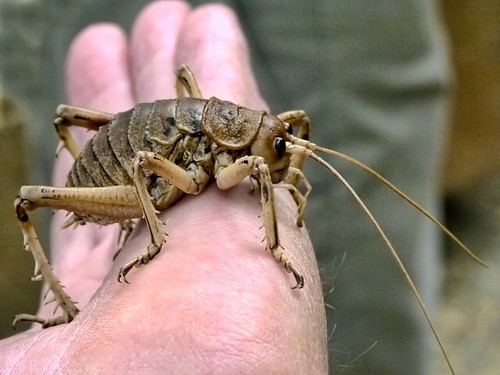Welcome to Word Buzz Wednesday, in which we round up our favorite buzzworthy words of the week. The latest: a cannabinoid of supreme joy; a cricket on steroids; and hikers who get annoyed.
anandamide
“The lab also has studied how the chemicals in cannabis, as well as cannabinoids like the anandamide produced by our bodies, protect our brains against various types of insults, such as physical and emotional trauma.”
Hampton Sides, “Science Seeks to Unlock Marijuana’s Secrets,” National Geographic, June 2015
In 1992, an organic chemist in Israel named Raphael Mechoulam and his colleagues “isolated the chemical made by the human body that binds to the same receptor in the brain that THC does.” Mechoulam named the chemical anandamide, which comes from the Sanskrit word for “supreme joy.”
giant weta
“Giant weta, for their monstrous size, are actually quite sweet. Not like cuddly sweet, though you’re welcome to try, but sweet nonetheless.”
Matt Simon, “Absurd Creature of the Week: This Bug Is as Big as a Gerbil. Fortunately It Loves Carrots,” WIRED, June 5, 2015
Giant weta, at 2.5 ounces, are the heavyweights of the insect world. There are about 70 known species of the cricket-like creature, ranging from extra-large, like the giant weta, to medium and small, like the tree, cave, and ground weta.
New Zealand’s signature bug, the weta is so entrenched in Kiwi-culture that Peter “Lord of the Rings” Jackson named his Wellington-based special effects and props company the Weta Workshop.
The word weta is Maori in origin.
ICU psychosis
“As a young doctor in the 1980s, Inouye pioneered efforts to diagnose and prevent the condition, which was then called ‘ICU psychosis.’”
Sandra G. Boodman, “The Overlooked Danger of Delirium in Hospitals,” The Atlantic, June 7, 2015
ICU psychosis is an old name for a type of delirium experienced by patients in intensive-care units, and characterized by “vivid hallucinations, delusions, and an inability to focus.” In older patients such delirium is sometimes misdiagnosed as dementia. Some studies say up to 85 percent of ICU patients experience it, even for months after discharge.
The word delirium comes from the Latin delirare, which means “be crazy, rave” and is translated literally as “go off the furrow.”
kill chain
“In the event of a war, China’s kill chain could locate, identify, and track enemy ships — especially big ones like aircraft carriers — and proceed to sink them.”
Kyle Mizokami, “How China stealthily built a ‘kill chain’ in the South China Sea,” The Week, May 21, 2015
Kill chain is a military term for a “web of sensors on manned and unmanned aircraft, spy satellites, surface ships, and submarines,” used to track and destroy enemy crafts. China’s kill chain is made up of island outposts that stretch from the South China Sea “all the way back to Beijing.”
‘Wild’ effect
“‘People are definitely worried about the ‘Wild’ effect, though we can’t really figure out what it is yet,’ said Dan Moe, a baker from Portland, Oregon who’s hiking this year.”
Claire Trageser, “The ‘Wild’ effect,” Mashable, May 17, 2015
The ‘Wild’ effect describes the surge in popularity of the Pacific Crest Trail after the publication of Cheryl Strayed’s memoir based on her experience of hiking the trail and the release of the film version of the book.
Other places that have enjoyed a tourism boom from movies or TV shows include Bruges, Belgium (In Bruges), Forks, Washington (Twilight), and Cardiff, Wales (Doctor Who and Torchwood).
[Photo via Flickr: “Cook Strait Giant Weta,” CC BY 2.0 by Sid Mosdell]
